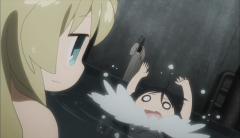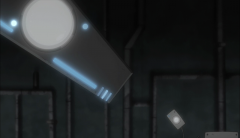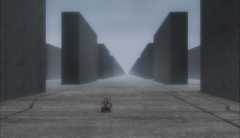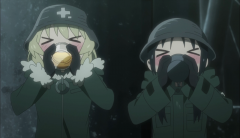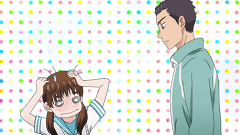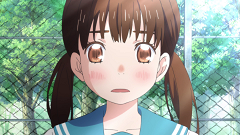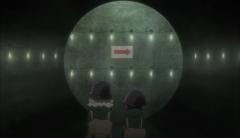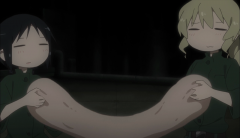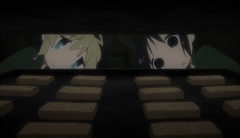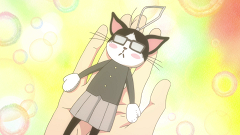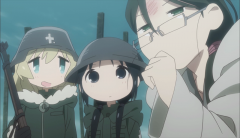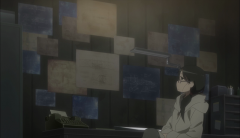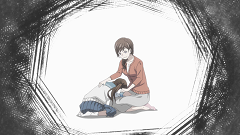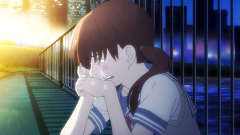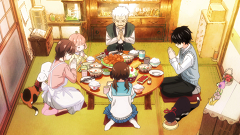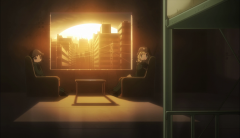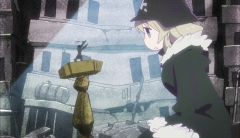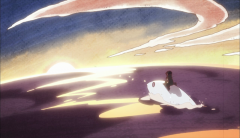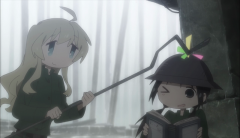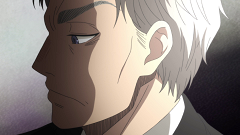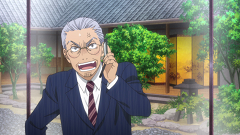Leave it to Girls’ Last Tour to not only address the meaning of life in their lifeless world, but also what does life itself even mean. “What is life?”, that question is asked several times during the episode, and the girls can only come up with the most direct, simplest answer to this grand question. We are the life form, robot sure isn’t. Even us, the viewers, in this age and day, don’t even consider robot as a lifeform, do we? Since life is organic, including the capacity for growth, reproduction, functional activity, something that a mere robot doesn’t have. Girls’ Last Tour challenges that notion, as the show follows our girls into the one of the remaining fishery. The place is still automated functioned by a giant robot, and further inside is another robot who takes care of the last remaining fish in this fishery (if you noticed we’ve seen a lot of “last” in this series: the last flying airplane, the last potato few episodes back). The girls argue robots don’t have consciousness, yet their coding POV pretty much suggests that they process a consciousness of their own. The girls argue they can’t think on their own, yet in this episode they manage to do just that: talking to the girls, managing to keep on going even though the human race is gone. The girls argue that they don’t have feeling, yet they share a level of empathy that eventually touch them. Don’t those make the robot, then, a fully animated being?
And in fact, the concept of life that the robot explains is far beyond the life-concept of human being. The living things, organic and non-organic being include, inside the world forms a wholly giant organism. That world used to be “alive”, but now all we see is the remains of this death world. One of the main takeaway from the girls about “life” at the end, is that “maybe “life” means something that has an end”. That takeaway again aligns so well with Girls’ Last Tour main theme’s and its outlook of life. Throughout this episode, Chi-chan experiences herself in a brink of death by nearly get drowned in the fish pool. The plot soon thickens as the big robot decides to demolish the building, meaning the little robot and the last living fish will be soon dying as well. As soon as the girls acknowledge that the robots have life, they have to end the life of the big robot in order to save other lives. Killing it so to speak. This sequence won’t be as affecting without the moment when the big robot looks back, right before the Chi-chan pulls the trigger. That moment is an acknowledgement about the life the big robot has, as well as the acceptance that eventually everything will have to die, so the best way to die is to live on and hang in there (to borrow the lines from Kino’s Journey few episodes back).
The sense of empathy is another theme Girls’ Last Tour successful raises this week. Just look at how Yuu changes her attitude towards the fish: at first, she just wanted to eat the goddamn fish, then she is allowed to feed the fish, later on when she knows the fish is in danger, she decides to step in to save it. Empathy also plays a significant role in small robot part, as it sounds and behaves the most humane out of anyone in the cast so far and to the big robot, as I can see the empathy level of the robot towards the girls: it knows Yuu tries to kill it yet it seems to understand the reason behind it and gives in. It’s when you are truly alive that you can feel empathy. Girls’ Last Tour, once again, says so much by showing so little, asks so much about the deeper meaning of life with its low-key yet sometimes ambiguous approach. Another real winner episode for me.



